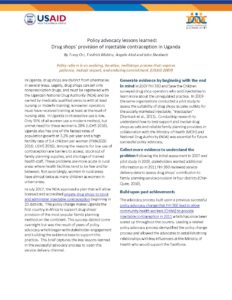Abstract
In Uganda, drug shops are distinct from pharmacies in several ways. Legally, drug shops can sell only nonprescription drugs, and must be registered with the Ugandan National Drug Authority (NDA) and be owned by medically qualified persons with at least nursing or midwife training; nonowner operators must have received training at least at the level of nursing aide. In Uganda contraceptive use is low. Only 35% of all women use a modern method, but unmet need for these women is 28% (UDHS 2016). Uganda also has one of the fastest rates of population growth at 3.2% per year and a high fertility rate of 5.4 children per woman (PMA2020 2016; UDHS 2016). Among the reasons for low use of contraception are barriers to access, stock out of family planning supplies, and shortage of trained health staff. These problems are more acute in rural areas where health facilities tend to be few and far between. Not surprisingly, women in rural areas have almost twice as many children as women in urban areas.
In July 2017, the NDA approved a plan that will allow licensed and accredited private drug shops to stock and administer injectable contraception beginning in 20 districts. This policy change makes Uganda the first country in Africa to support drug shops’ provision of the most popular family planning method on the continent. This success did not come overnight but was the result of years of policy advocacy which began with stakeholder engagement and building the evidence base to support this practice. This brief captures the key lessons learned in the successful advocacy process to open this service delivery channel.



